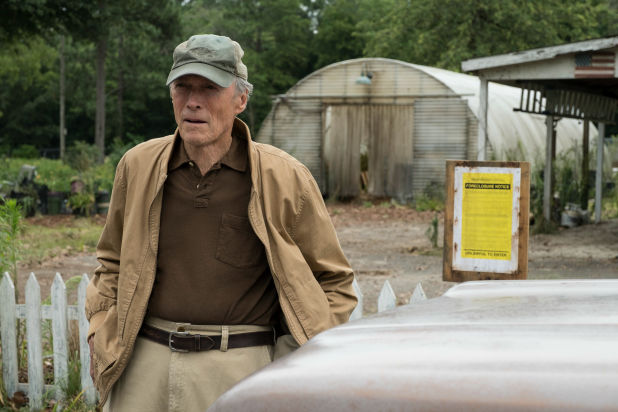REVIEW: Clint Eastwood’s ‘The Mule’ is preachy, slow, but allows room for reflection
By now, we all kind of understand Clint Eastwood’s schtick. He’s been around seemingly for centuries, and he wears his beliefs on his sleeve. He doesn’t like cellphones and their effect on younger generations, and damn it all if he doesn’t wish he could go back to the good old days.
He’s essentially the film industry’s grandpa, the one you love but try not to engage in a political debate with at Christmas or else he’ll end up on a tangent that winds up looking like the screenplay for “Gran Torino.”
Eastwood’s latest film, “The Mule,” follows closely along with his expected formula, and is all the more drab for it. The few times the film shines, however, is when the 88-year-old director flips the camera around for a bit of subtle self-reflection, looking back over a film career that has spanned a whopping 64 years.
“The Mule” follows the unlikely true story of Earl Stone (Eastwood), a down-on-his-luck 90-year-old horticulturalist. Earl used to dominate the nearby tournament circuit, collecting awards and reaping enough money to keep his gardens afloat.
During that time, though, Earl has basically ignored his family: his wife, Mary (Dianne Wiest); his daughter, Iris (Clint’s real-life daughter Alison Eastwood); and his granddaughter, Ginny (Taissa Farmiga). Earl gets so caught up in his work planting flowers and showing them in competitions, perhaps slightly dramatized for effect, that he essentially doesn’t have a family anymore.
When the credit union forecloses his property, Earl has nowhere to go and no money to start elsewhere, until he hears of a driving job. All he has to do is drive from Point A to Point B with no complications and he is paid exorbitant amounts of money. The only problem: As he finds out during his fourth trip, Earl is moving extravagant amounts of cocaine for Mexican drug cartels.
FILM FACT BOX
Title: The Mule
Director: Clint Eastwood
Starring: Clint Eastwood, Bradley Cooper, Taissa Farmiga, Michael Peña, Laurence Fishburne, Dianne Wiest
Writers: Nick Schenk, Dave Holstein
Runtime: 116 minutes
The film’s biggest problem is that, while cinematographer Yves Bélanger does his best to spruce up the imagery with colors fit for Earl’s garden, the screenplay is bone dry, especially for the first half of the film. The film’s opening hour or so essentially plays out like a road trip movie; the only issue is that the audience’s only companion on the ride is a 90-year-old man who likes to sing Bob Nolan songs.
The second half of the movie picks up the pace a bit, as DEA agent Colin Bates (Bradley Cooper) starts to swarm in on Earl as he nears the end of his final run. The suspense ratchets up slightly, but it’s difficult for any filmmaker to execute a classic cat-and-mouse scenario when one of its players is geriatric and slow.
Following in the footsteps of many of his other films, Eastwood takes as many opportunities as he can to squeeze in digs at millennials and their damn cellphones. At one point, he goes so far as to tell a family of “Negroes” — the film’s words, not mine — that generations younger than his “can’t open a fruit box without calling the internet.”
There’s a clear message here, one fit for a horticulturist: Get out and smell the roses. Halfway through, Earl tells his handler he needs to live more like Earl does. It’s clear he means to get our noses out of the screen, but it’s hard to take advice from a man peddling drugs for a violent gang of criminals.
Earl abandons his family to plant flowers, then again to mule drugs into major cities. He parties in Mexico at a drug lord’s mansion and has not one, but two threesomes in the film, each time with two women whose combined age doesn’t come close to Eastwood’s. No amount of generational knowledge and wisdom can make up for a hypocritical lecture from someone blatantly in the wrong.
The parallels between Eastwood’s work ethic — “The Mule” was the second film he directed to come out in 2018 — and Earl’s seem to be purposeful. Work ethic is one way to put it; disregard for other responsibilities is another. It’s not so much an apology as it is an acknowledgement, and Eastwood at least has to be commended for that level of self-awareness.
The film, as a whole, isn’t so much bad as it is disappointingly dull. Eastwood directs the scenes with a clear sense of efficiency, for which he’s famous, and the pacing does pick up in the second half.
All things considered, “The Mule” is probably Eastwood’s best film as a director since “Million Dollar Baby” 15 years ago, but a lack of excitement and grating preachiness moves the action at such a sluggish pace that it’s hard to relate to the protagonist by the story’s end.
GRADE: C
Cameron Hoover is a film critic. Contact him at [email protected].


